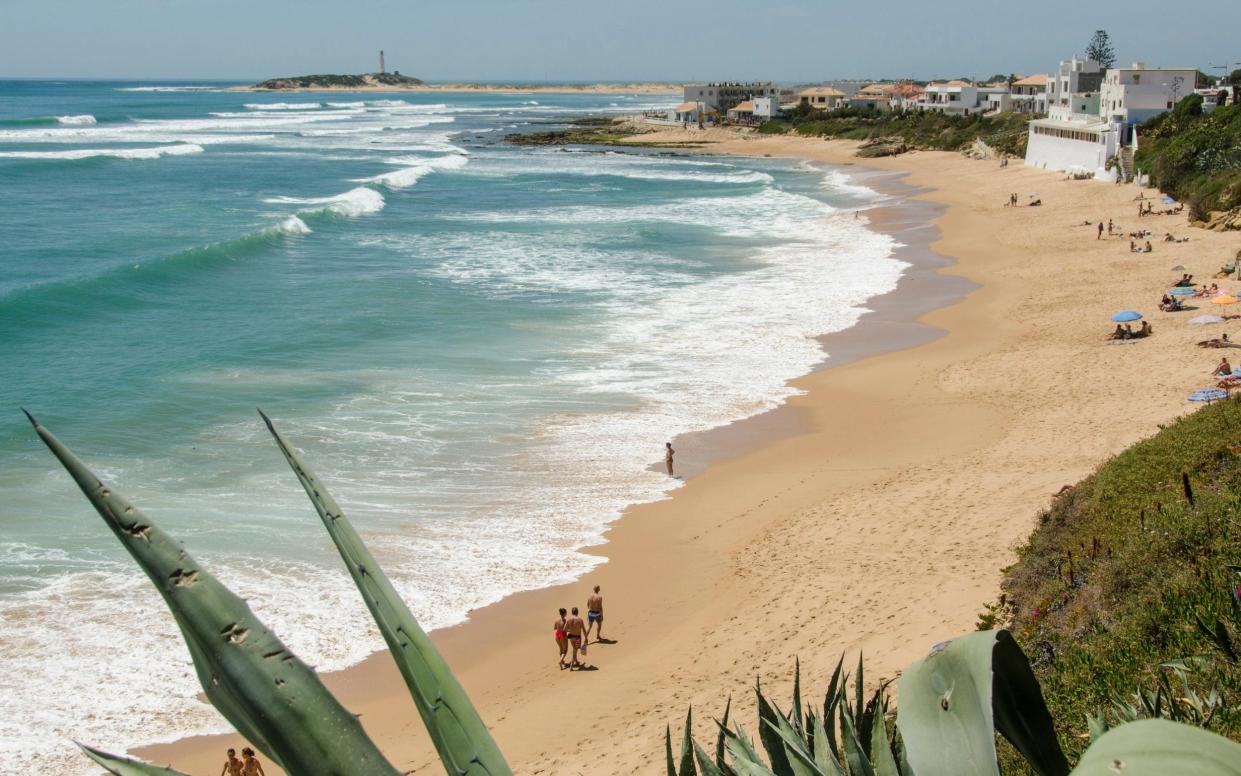Half-term holiday chaos as only double-jabbed Britons will be allowed into Spain, ruling out most children

Families face half-term holiday chaos as Spain will not let in children with only one jab, even if they have had Covid.
Spain - the UK’s most popular holiday destination, with more than 18 million visitors a year - has ruled that only fully jabbed Britons will be allowed in after classing Britain as a “high risk” country.
It means up to 2.5 million British children aged 12 to 15 are effectively barred from Spain because they are not fully vaccinated. Only 300,000 - or 12 per cent - of British 12 to 15-year-olds have so far had two jabs, while just half - 52 per cent - have had one dose. The rest are unjabbed.
As an alternative, Spain will accept Covid recovery certificates for arrivals from high risk countries who have had the virus, but not from the UK.
In a statement posted on its website, the Foreign Office warned: “If you’re travelling to Spain for tourism purposes, you cannot use the UK proof of Covid-19 recovery record certifying that you have recovered from Covid-19 in the last 6 months.”
Paul Charles, chief executive of travel consultancy The PC Agency, said the restrictions and confusion over the requirements for travel were causing havoc. “The 12 to 17-year-old age group has suffered disproportionately. That’s why so many family holidays have been cancelled,” he said.
“It is an age group that has suffered especially in Europe with other countries imposing tougher restrictions on them because they have not been fully vaccinated.
“It is a direct consequence of the Government not prioritising 12 to 17-year-olds to be fully jabbed, while other European nations have done so.”
It threatens half-term disappointment for many families planning skiing holidays in the Spanish Pyrenees or trips to holiday homes or tourist hotspots like the Balearics, Canaries, Barcelona, Seville, Madrid, and Valencia. Only under-12s are exempt.
Government 'right on boosters, but not on children'
“The Government got it right on booster jabs,” said another senior travel industry source. “But they didn’t get it right on children. We are well behind the Europeans who started treating children as adults much earlier for vaccine purposes.”
The chaos comes just a day after the Government ditched all tests for vaccinated travellers and scrapped quarantine and day-eight tests for unjabbed people and children returning to the UK.
Children aged 12 to 15-years-old will also get access to digital Covid passes from February 3 in time for half-term. At present they are excluded from using it, curbing their ability to easily prove their jab status.
Difficulties in other countries
Single-jabbed children who have not had Covid could, however, still face difficulties in other countries. The Super Green Pass in force in Italian ski resorts requires proof of vaccination or past infection for anyone over 12 to access services including lifts, restaurants, bars and hotels. A negative test is no longer accepted to activate the pass.
Travellers who are not fully vaccinated are not permitted to visit France. But unvaccinated children aged 12 and over must provide a negative test result like all adults, and are exempt from isolating if travelling with a double-vaccinated adult.
The “Ninja Pass” scheme in Austria applies to children aged 12 to 15, who must take two PCR tests plus one antigen test during the course of a week’s holiday to obtain a lift pass and entry to all hospitality venues.
Twelve to 15-year-olds have only been eligible for second doses since December 20. The low take-up may have been affected by the numbers catching Covid. Figures on Tuesday showed pupil absence due to Covid more than doubled in a fortnight from two per cent (159,000) to 3.9 per cent (322,000).
Crackdown on truancy
Meanwhile, the Government is launching a crackdown on truancy as school absence rates more than doubled in the wake of the pandemic.
Schools will be given a new legal duty to draw up an attendance policy, under proposals from the Department for Education (DfE).
There are currently 12.6 per cent of pupils absent from school, according to the latest official figures released on Tuesday.
This includes 5.1 per cent of pupils who were absent because they have tested positive for Covid, have symptoms or have been sent home owing to an outbreak.
During the autumn and spring terms of the academic year 2018/19, the average absence rate was 4.7 per cent. For the decade prior to the pandemic, absence rates had generally been falling from 6.4 per cent in 2006/7.
Ministers are concerned that while Covid accounts for some of the additional absence rate, there is still a high number of children who have failed to return to school after lockdown.
Nadhim Zahawi, the Education Secretary, said that while absence due to Covid is “unavoidable” there are other reasons why children are missing out on school.
Officials at the DfE have published plans to set national rules on attendance, including when parents should be issued with fines for their child's absence.
Fines could be considered after a certain number of unauthorised absences from a pupil within a certain period and for persistent incidents of lateness, the proposals say.

 Yahoo News
Yahoo News 
